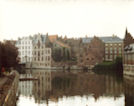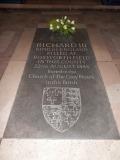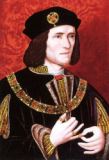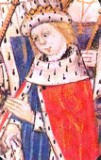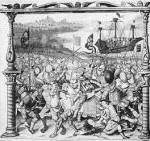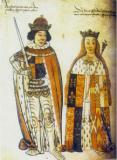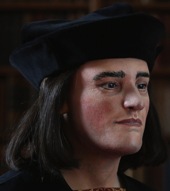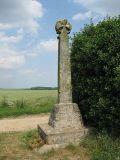
Towton Cross
Battle of Towton – the bloodiest battle ever fought on English soil
The Battle of Towton , regarded as “the largest and bloodiest battle ever fought on English soil”, was fought in a snow storm on Palm Sunday, 29 March 1461, between the Lancastrian forces of King Henry VI and the Yorkist forces led by Edward, Earl of March. It has been said that 28,000 men died that day, out of 50,000 to 100,000 soldiers. The result was a Yorkist victory and Edward became king as Edward IV.
In 1996 a mass grave of fallen soldiers was found at Towton Hall. Their remains have been studied by the University of Bradford.
Edward IV had planned to build a memorial chapel at Towton, but it was Richard III, who put this plan into action. The chapel was nearly finished, when he was killed at Bosworth, and the chapel had been lost. Or so it was thought. In October 2013 it was revealed that scientists had found strong evidence of remains of the chapel.
In 2010 fragments of hand held guns and lead shot were found at the battle site, the earliest ever to be found.
References:
James Clark, ‘The Medieval Somme: forgotten battle that was the bloodiest fought on British soil’, The Conversation (13 July 2016). URL: https://theconversation.com/the-medieval-somme-forgotten-battle-that-was-the-bloodiest-fought-on-british-soil-62129 [last accessed 2 March 2020]
Helen Cox, ‘The Battle of Towton is alive and well in Yorkshire’, Herstory Writing & Interpretation.. Link “Towton” on URL: http://helencox-herstorywriting.co.uk/articles/4539783477 [last accessed 2 March 2020]
T. Sutherland & A. Schmidt,’The Towton Battlefield Archaeological Survey Project: An Integrated Approach to Battlefield Archaeology’, Landscapes, Vol.4, Issue 2 (October 2003), pp.15-25. Available at URL: https://www.researchgate.net/publication/238691750_The_Towton_Battlefield_Archaeological_Survey_Project_An_Integrated_Approach_to_Battlefield_Archaeology [last accessed 2 March 2020]
‘Richard III Towton chapel remains are ‘found’’, BBC News York & North Yorkshire (7 Oct 2013). URL: http://www.bbc.co.uk/news/uk-england-york-north-yorkshire-24434795 [last accessed 2 March 2020]
A short description of the various battles of the Wars of the Roses can be found on the website of the Richard III Society.
Dorothea Preis
Tags: Battles, Edward IV, Richard III, Towton, Wars of the Roses, Yorkshire
